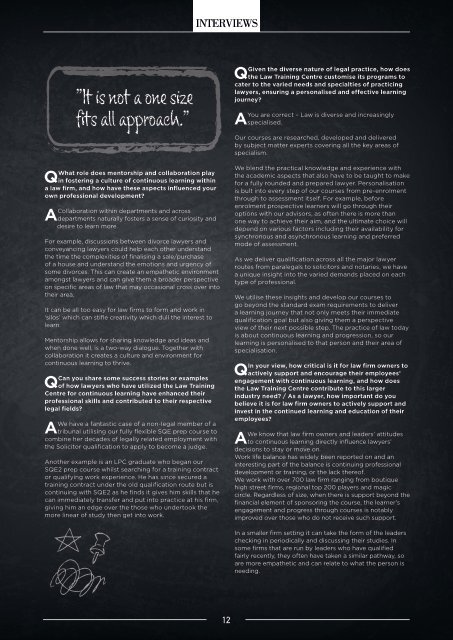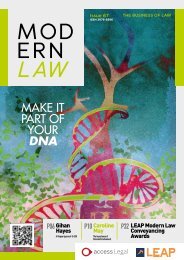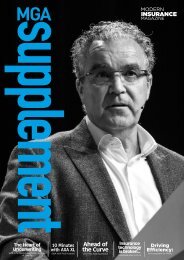Modern Law Magazine Issue 69
You also want an ePaper? Increase the reach of your titles
YUMPU automatically turns print PDFs into web optimized ePapers that Google loves.
INTERVIEWS<br />
“It is not a one size<br />
fits all approach.”<br />
What role does mentorship and collaboration play<br />
Q in fostering a culture of continuous learning within<br />
a law firm, and how have these aspects influenced your<br />
own professional development?<br />
Collaboration within departments and across<br />
A departments naturally fosters a sense of curiosity and<br />
desire to learn more.<br />
For example, discussions between divorce lawyers and<br />
conveyancing lawyers could help each other understand<br />
the time the complexities of finalising a sale/purchase<br />
of a house and understand the emotions and urgency of<br />
some divorces. This can create an empathetic environment<br />
amongst lawyers and can give them a broader perspective<br />
on specific areas of law that may occasional cross over into<br />
their area.<br />
It can be all too easy for law firms to form and work in<br />
‘silos’ which can stifle creativity which dull the interest to<br />
learn.<br />
Mentorship allows for sharing knowledge and ideas and<br />
when done well, is a two-way dialogue. Together with<br />
collaboration it creates a culture and environment for<br />
continuous learning to thrive.<br />
Can you share some success stories or examples<br />
Q of how lawyers who have utilized the <strong>Law</strong> Training<br />
Centre for continuous learning have enhanced their<br />
professional skills and contributed to their respective<br />
legal fields?<br />
We have a fantastic case of a non-legal member of a<br />
A tribunal utilising our fully flexible SQE prep course to<br />
combine her decades of legally related employment with<br />
the Solicitor qualification to apply to become a judge.<br />
Another example is an LPC graduate who began our<br />
SQE2 prep course whilst searching for a training contract<br />
or qualifying work experience. He has since secured a<br />
training contract under the old qualification route but is<br />
continuing with SQE2 as he finds it gives him skills that he<br />
can immediately transfer and put into practice at his firm,<br />
giving him an edge over the those who undertook the<br />
more linear of study then get into work.<br />
Given the diverse nature of legal practice, how does<br />
Q the <strong>Law</strong> Training Centre customise its programs to<br />
cater to the varied needs and specialties of practicing<br />
lawyers, ensuring a personalised and effective learning<br />
journey?<br />
You are correct – <strong>Law</strong> is diverse and increasingly<br />
A specialised.<br />
Our courses are researched, developed and delivered<br />
by subject matter experts covering all the key areas of<br />
specialism.<br />
We blend the practical knowledge and experience with<br />
the academic aspects that also have to be taught to make<br />
for a fully rounded and prepared lawyer. Personalisation<br />
is bult into every step of our courses from pre-enrolment<br />
through to assessment itself. For example, before<br />
enrolment prospective learners will go through their<br />
options with our advisors, as often there is more than<br />
one way to achieve their aim, and the ultimate choice will<br />
depend on various factors including their availability for<br />
synchronous and asynchronous learning and preferred<br />
mode of assessment.<br />
As we deliver qualification across all the major lawyer<br />
routes from paralegals to solicitors and notaries, we have<br />
a unique insight into the varied demands placed on each<br />
type of professional.<br />
We utilise these insights and develop our courses to<br />
go beyond the standard exam requirements to deliver<br />
a learning journey that not only meets their immediate<br />
qualification goal but also giving them a perspective<br />
view of their next possible step. The practice of law today<br />
is about continuous learning and progression, so our<br />
learning is personalised to that person and their area of<br />
specialisation.<br />
QIn your view, how critical is it for law firm owners to<br />
actively support and encourage their employees’<br />
engagement with continuous learning, and how does<br />
the <strong>Law</strong> Training Centre contribute to this larger<br />
industry need? / As a lawyer, how important do you<br />
believe it is for law firm owners to actively support and<br />
invest in the continued learning and education of their<br />
employees?<br />
We know that law firm owners and leaders’ attitudes<br />
A to continuous learning directly influence lawyers’<br />
decisions to stay or move on.<br />
Work life balance has widely been reported on and an<br />
interesting part of the balance is continuing professional<br />
development or training, or the lack thereof.<br />
We work with over 700 law firm ranging from boutique<br />
high street firms, regional top 200 players and magic<br />
circle. Regardless of size, when there is support beyond the<br />
financial element of sponsoring the course, the learner’s<br />
engagement and progress through courses is notably<br />
improved over those who do not receive such support.<br />
In a smaller firm setting it can take the form of the leaders<br />
checking in periodically and discussing their studies. In<br />
some firms that are run by leaders who have qualified<br />
fairly recently, they often have taken a similar pathway, so<br />
are more empathetic and can relate to what the person is<br />
needing.<br />
12
















